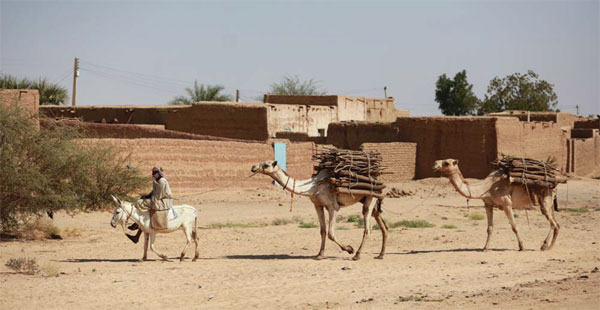Sudan draws Chinese to pyramid wonderland

Lying along humanity's mother river - the Nile - Sudan was home to numerous ancient civilizations, such as the Kingdom of Kush, Kerma, Nobatia, Alodia, Makuria, Meroe and others. Now the African country welcomes Chinese tourists to explore its old pyramids, along with its Red Sea port resorts.
Sudan is the third-largest country in Africa and the third-largest country in the Arab world. The Nile divides the country into eastern and western halves.
Ali Ahmed Hamid, governor of the country's Red Sea state, told China Daily with pride that in Sudan there are not only historic relics to view but unique landscapes where deserts, seas and mountains melt together.
A big draw for Chinese tourists in Sudan are the Nubian pyramids at Meroe - much smaller but just as impressive as their more famous Egyptian counterparts. They're found on the east bank of the Nile, near a group of villages called Bagrawiyah.
| A man transports firewood by camel at the edge of Nubian Desert in the north of Sudan. Photos by Ren Qi / China Daily |
| An outdoor barbershop serves locals with haircuts and shaves in the corner of a market in Khartoum, the capital of Sudan. |
The Sudanese and Chinese governments have signed a memorandum of understanding making the country a travel destination for Chinese tourists.
Awad Ahmed Al-Jaz, assistant to the Sudanese president, said the government has paid special attention to the Chinese tourist market and hopes to get help for the development of its tourism industry by participating in China's Belt and Road Initiative.
"Located in central Africa, Sudan is geographically important and plays a role as a key channel for China - not only in connecting with Africa, but also in connecting with the Arab world," Al-Jaz says. "China and Sudan have made great progress on cooperation in the fields of oil and related energy sectors, and we hope such relations and cooperation will extend into the tourism industry."
To attract Chinese tourists, Sudan is now considering introducing a series of convenience policies for tourists, acoording to Adil Hamid, state minister of tourism, antiquities and wildlife.
"We are considering simplifying the procedures for Chinese tourists to apply for a tourist visa. Meanwhile, we will start the discussion about restarting direct flights from China to Sudan," he says.
While the government of Sudan is busy developing its tourism industry, some Chinese companies have already started up business operations in the country and are playing a significant role in promoting local tourism.
The Nantong Hotel is one example.
Invested by Nantong Construction Group of China, the hotel, in the capital city of Khartoum, has become one of the best-known four-star hotel in the downtown.
"Nantong Construction Group entered the Sudan market in 1988, and business increased rapidly after 2005," says Pei Yonghong, the hotel's general manager. "China started the Belt and Road Initiative and the company was inspired, so we decided to take on two tourism projects in Khartoum with some of the investment benefits. One is the Nantong Hotel; the other is the River Nile Farming Resort in the countryside."
One of the earliest foreign tourism projects, the hotel development has been satisfying, Pei says. It has 11 Chinese employees and 22 foreign employees from Sudan, the Philippines and Ethiopia.
About 60 percent of the guests are from China, while the rest are from Europe, Africa and other Arab countries.
Speaking of potentials in tourism cooperation between the two countries, Pei says he is actively communicating with Chinese tourism agencies to explore more African tourism routes that could include Sudan.
"In light of the Belt and Road Initiative, China and Sudan will surely enhance their cooperation in tourism. I believe our tourism business in this African country will be a success," Pei says.
Graham Abdul Qadir, deputy tourism minister, said Sudan has various tourism resources - the confluence of the Blue Nile and White Nile in Khartoum, beautiful natural landscapes and natural conservation areas - all of which show the diversity the country.
"We are looking forward to having Chinese tourism here, and we welcome Chinese investors in our tourism industry," he says.
renqi@chinadaily.com.cn
(China Daily Africa Weekly 01/13/2017 page19)
Today's Top News
- UN envoy calls on Japan to retract Taiwan comments
- Innovation to give edge in frontier sectors
- Sanctions on Japan's former senior official announced
- Xi stresses importance of raising minors' moral standards
- Coordinated reform key to country's growth
- Shandong gives new life to traditions
































